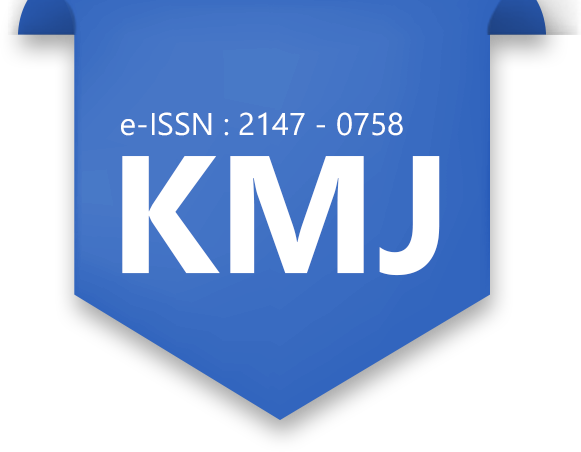
Cholesterol Levels in Subclinical Hypothyroidism and the Effect of Levothyroxine Treatment on Cholesterol Levels
İlyas Tenlik1, Ömer Öztürk2, Mustafa Kaplan2, Hasan Ali Altunbas31Ankara City Hospital, Department of Gastroenterology, Ankara, Turkey2Memorial Kayseri Hospital, Department of Gastroenterology, Ankara, Turkey
3Akdeniz University Faculty of Medicine, Department of Endocrinology, Antalya, Turkey
INTRODUCTION: In this study, fasting and postprandial cholesterol levels were investigated in patients diagnosed with subclinical hypothyroidism (SH), and it was investigated whether thyroxine treatment had an effect on these cholesterol levels.
METHODS: Newly diagnosed 50 SH and 25 euthyroid patients were included in the study. The first 25 patients with SH were the treatment group (group I) and the second 25 patients with SH were the control group without treatment (group II).
RESULTS: At the first admission, fasting and postprandial glucose, fasting fT4 and fT3 levels were significantly lower in patients with subclinical hypothyroidism compared to euthyroid patients, while fasting TSH levels were higher. There was no significant difference in other parameters. According to these results, it was observed that whether the patients had SH or not did not affect the fasting or postprandial cholesterol levels of the patients. At the end of the third month, basal and postprandial values were compared between the groups that received treatment with subclinical hypothyroidism (group 1) and those who did not receive treatment (Group 2). While fasting and postprandial total cholesterol and TSH values were statistically significantly higher in the untreated group, fT4 and fT3 values were significantly lower. However, the amount of change in cholesterol levels (delta 0-3 months) was evaluated and no statistical difference was observed.
DISCUSSION AND CONCLUSION: No difference was found in terms of cholesterol profile in both fasting and postprandial periods in patients with SH compared to euthyroid control group. There was no improvement in fasting or postprandial cholesterol levels with thyroxine treatment.
Keywords: subclinical hypothyroidism, serum cholesterol, HDL, LDL, trygliceride
Subklinik Hipotiroidide Kolesterol Düzeyleri ve Levotiroksin Tedavisinin Kolesterol Düzeyleri Etkisi
İlyas Tenlik1, Ömer Öztürk2, Mustafa Kaplan2, Hasan Ali Altunbas31Ankara Şehir Hastanesi, Gastroenteroloji Kliniği, Ankara, Türkiye2Memorial Kayseri Hastanesi, Gastroenteroloji Kliniği, Kayseri, Türkiye
3Akdeniz Üniversitesi Tıp Fakültesi Endokrinoloji Bilim Dalı, Antalya, Türkiye
GİRİŞ ve AMAÇ: Bu çalışmada subklinik hipotiroidi (SH) tanısı alan hastalarda açlık ve postprandial kolestrol düzeyleri araştırılmış ve tiroksin tedavisinin bu kolestrol düzeylerine etkisinin olup olmadığı incelenmiştir.
YÖNTEM ve GEREÇLER: Çalışmaya yeni tanı almış 50 SH’li ve 25 ötiroid hasta alındı. Başvuran ilk 25 SH’li hasta tedavi grubunu (grup I) ve ikinci 25 SH’li hasta tedavi almayan kontrol grubunu (grup II) oluşturdu.
BULGULAR: İlk başvuruda subklinik hipotiroidili hastalarda ötiroid olanlara göre, açlık ve postprandial glukoz, açlık sT4 ve sT3 düzeyleri anlamlı olarak daha düşükken, açlık TSH düzeyi daha yüksekti. Diğer parametrelerde anlamlı farklılık saptanmadı. Bu sonuçlara göre hastaların SH’li olup olmamasının hastaların açlık veya postprandiyal kolestrol düzeylerini etkilemediği görülmüştür. Üçüncü ay sonunda subklinik hipotiroidili tedavi alan (grup 1) ve tedavi almayan (Grup 2) gruplar arasında bazal ve postprandial değerler kıyaslandı. Tedavi almayan grupta açlık ve postprandial total kolesterol ve TSH değerleri istatiksel açıdan anlamlı olarak daha yüksekken, sT4 ve sT3 değerleri anlamlı olarak düşüktü. Ancak kolestrol seviyelerinde değişim miktarı (delta 0-3 ay) bakıldı ve istatistiksel fark izlenmedi.
TARTIŞMA ve SONUÇ: Çalışmamızda SH’li hastalarda ötiroid kontrol grubu ile karşılaştırıldığında; hem açlık, hem de postprandial dönemde aterojenik kolesterol profili açısından farklılık saptanmamıştır. Tiroksin tedavisi ile açlık veya postprandial kolesterol düzeylerinde iyileşme tespit edilmemiştir.
Anahtar Kelimeler: subklinik hipotiroidi, serum kolestrol, HDL, LDL, trigliserid
Manuscript Language: Turkish












